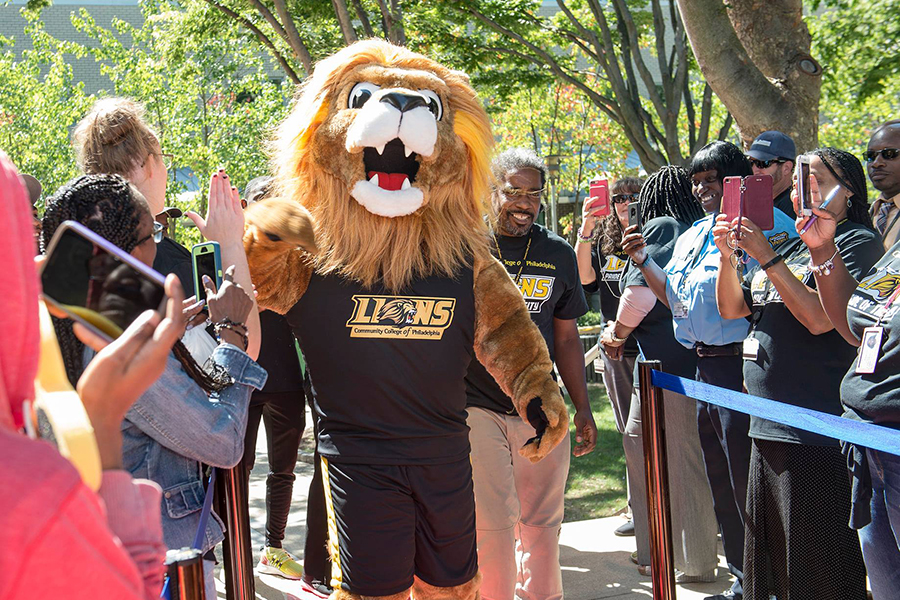Philadelphia’s crowd of gender-fluid mascots grew a little bigger last week when the Community College of Philadelphia unveiled Roary, a nonbinary lion hailing from a pride that calls Chief’s Island in Botswana home.
In this southern African pack, scientists have identified female members with higher-than-average levels of testosterone that grow manes and behave in ways typically associated with male lions, according to CCP staff.
Roary joins the city’s cohort of nonbinary crowd-stokers alongside the Please Touch Museum’s purple, wide-eyed icon Squiggles and the Philadelphia Flyers’ beloved, slightly-terrifying, slice-of-orange-mayhem Gritty.
But less than a week after the furry feline’s Sept. 17 debut at a CCP campus launch, Vincent Scarfo, coordinator at CCP’s MarcDavid LGBTQ Center, wants people to know the mascot has already experienced something that trans, nonbinary and gender nonconforming folks encounter all too often: being misgendered.
Scarfo, a nonbinary trans person, penned an open letter to the campus community Monday stating that many who attended last week’s event used he/him pronouns — instead of the accurate they/them verbiage — while introducing Roary.
“I know that many people who misgendered Roary did not intend to do so, but were simply unaware that Roary is non-binary,” the note continues. “This is something that we could have done better as a college, and we should have made a point to talk about Roary’s identity and pronouns at the event more explicitly to ensure that people knew the correct way to refer to them.”
An August 2018 study by The Williams Institute found more than 70 percent of nonbinary higher education students in the United States experience frequent misgendering by on-campus physical and mental health care providers. On top of traditional turmoil in the college experience, these learners may also have difficulty finding compatible roommates in oft-binary campus living situations and struggle to have their correct names appear on university documents.
CCP adopted its new big cat in an effort to represent everyone on campus regardless of gender, Scarfo told PGN. University officials also wanted to appreciate the maned, iconic lions that decorate the doors of the Mint Building — the original historic home of the third Philadelphia Mint, which now serves as the campus’ centerpiece — and the fact that most of the school’s athletes are female. In a world where more than two-thirds of mascots are male, jumping on that trend wouldn’t accurately reflect the school’s athletic front, Scarfo explained.
Roary ousted CCP’s former years-old mascot Colonial Phil, which, in a 2016 petition for a new school icon, students said was an offensive nod to the nation’s history of prejudice. CCP pupils participated in several polls to help select the community college’s modern public face.
David Asencio, CCP’s dean of students, said the school’s mascot change had less to do with any controversy over Colonial Phil and rather centered around better representing the student body.
“The focus … was forging through with a new identity that more reflected the current demographics,” he told PGN. “Also, [students] wanted to embrace something that was more diverse and inclusive as a symbol.”
After Philadelphia was introduced to Gritty last September, City Council welcomed the Flyers mascot with a resolution describing the creation as “a 7-foot tall orange hellion,” a “ghastly empty-eyed Muppet with a Delco beard,” and “a non-binary leftist icon,” among other creative phrases.
That hellion, though, has largely been referred to with he/him vernacular since birth, including in official Flyers marketing materials.
On CCP’s campus, Scarfo said they hope Roary’s introduction sends a message of inclusivity to current and prospective LGBTQ-plus students.
“I hope they see it as a sign of the college trying to make this campus a safer place for them and that we see them and respect them,” they said. “I also hope that … we can use Roary as a tool to show people how to use correct pronouns for trans and intersex people and to make sure that they understand that using correct pronouns is very important to our community.”
The MarcDavid LGBTQ Center opened at the college last fall. CCP has a Chosen Name Policy, in which students can change their names in the college’s systems that don’t require a legal one, like on identification cards, class rosters and email accounts. That policy pre-dated the LGBTQ center’s launch, Scarfo said, though their first initiative as coordinator was to formalize the process.
Over the last year, CCP has also compiled a list of out faculty and staff members who LGBTQ students can turn to for support; developed multiple LGBTQ competency trainings; and collaborated with the Mayor’s Office of LGBT Affairs, the college’s legal studies department and the Pennsylvania Bar Association to develop free clinics where people can legally change their names. The next clinic will likely take place in November, Scarfo told PGN.
In addition to Roary’s they/them pronouns, CCP ascribed the cuddly campus hype person some endearing Philly qualities, including a love for soft pretzels, ‘wooder’ ice and cheesesteaks — all of which the big cat works off by bounding up the steps of the Philadelphia Museum of Art.
“Like so many of us in this nation of immigrants, Roary’s family moved to the United States when Roary was just a cub,” a CCP release reads, adding, “They loved the lush swamps and sweeping savannahs of Chief’s Island almost as much as they loved their unique pride, where all lions — regardless of gender — sport thick manes. … Roary and their family made a home in Philadelphia, where they knew they would find a new, welcoming pride with the same sense of community that comforted them on Chief’s Island.”
Updated 9/25/19 at 5:23 p.m. with comment from David Asencio, CCP’s dean of students.
